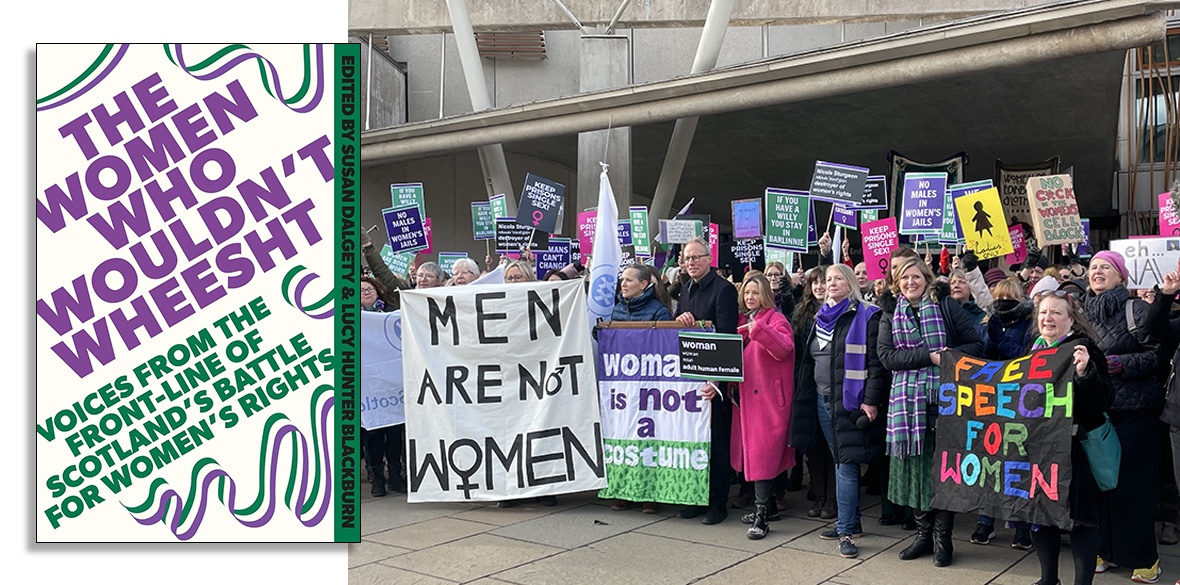This is the last article you can read this month
You can read more article this month
You can read more articles this month
Sorry your limit is up for this month
Reset on:
Please help support the Morning Star by subscribing here
The Women Who Wouldn’t Wheesht
Edited by Susan Dalgety and Lucy Hunter Blackburn
Constable, £22
“WHEESHT” is Scots, meaning a plea or demand for silence, is a collection of essays by women who “risked their job, reputation, even the bonds of family and friendship, to make their voices heard” and built a grassroots campaign in defence of their sex-based rights that was the key factor in defeating the Scottish government’s attempt to impose self-ID on the country.
Of major historical, political and social significance, these essays expose regressive and reactionary gender ideology; the only supposedly “progressive” social justice movement ever backed by state institutions, political elites and corporate finance, and the real consequences for women of policies like self-ID, championed not just by the Scottish government, but the country’s political Establishment.
The “ill-defined” term “gender identity” entered the “Scottish public space” through the lobbying of public institutions, business and politicians with the aim of obtaining the right “for anyone over the age of 16 years old to obtain legal recognition as a member of the opposite sex”, or of being neither sex, by a simple administrative process.
Sex in humans is binary and immutable, it is observed, not assigned at birth; women’s oppression is based on these facts. The consequences of self-ID would mean male access to women’s spaces, sports, hospital wards, the erosion of reliable sex-based data, and more.
The term “woman” was to be “broadened” — to include men. Most people understood this to be “transsexuals,” those who had actually “transitioned” based on medical oversight, but, no, it meant anyone who identified as a woman.
Along with self-ID, hate crime legislation was also proposed, which included protection for “cross-dressing” men, but not women, an authoritarian “No Debate” attempt to impose a legislative “scold’s bridle” on obstreperous women opposing the new orthodoxy.
The woman who coined the “WomanWontWheesht” hashtag movingly explains she raised her voice because her disabled daughter’s right to “same-sex intimate care” would be “reframed as bigotry” because “a grown man’s feelings were more important that a disabled girl’s dignity and safety.”
Anyone raising objections or even questions were summarily dismissed as bigots or reactionaries who were behind the times and who should educate themselves. For daring to speak out women across Britain, the price of heresy was high: they were vilified, censored, careers destroyed, ostracised, physically assaulted by young male “activists,” subjected to misogynistic and ageist abuse, ridiculed and smeared as bigots.
The media colluded too, raising comparisons with silencing of the earlier suffragette struggles and the “long history of women being locked out of politics.”
Shamefully, within our own trade union movement, socialist and communist women are silenced, deplatformed, smeared and investigated. Women are leaving unions in substantial numbers.
The voices in this book are of left-of-centre women, the damage done to our movement by its embrace of identity politics and anti-science gender ideology has the real reactionaries laughing their heads off at the division they have inflicted on our class.
Each essay rings with that limpid articulacy of truth, defiance and conviction that defines a movement built by these and many other women in defence of their hard-won sex-based rights.
Both gender recognition and hate crime legislation passed. The former may have been blocked by the Tories as it conflicted with the Equality Act, but it was really killed by the campaign organised by the women who wouldn’t wheesht. The embarrassing Hate Crime Act was rendered inoperable by one tweet from the author JK Rowling.
The activism described in this book should be an inspiration to every socialist and trade unionist on how to challenge the vested interests of the state, media and corporations,
But sadly, many trade unionists will fall for the great lie that these mainly working-class women, who organised from their “kitchen tables,” social media and in the streets, who struck a blow not just for women, but materialism, democracy and rationality are the enemy.
This book is far more than the sum of its parts. It should read by every serious person seeking to understand why the issue of gender ideology has provoked such division and controversy.
But more than that, it is a call for resistance against the demoralising, regressive and reactionary post-modernist queer theory that elevates selfish hyper-individualism above the crying need to transform society in the collective interests of us all — men and women alike.










